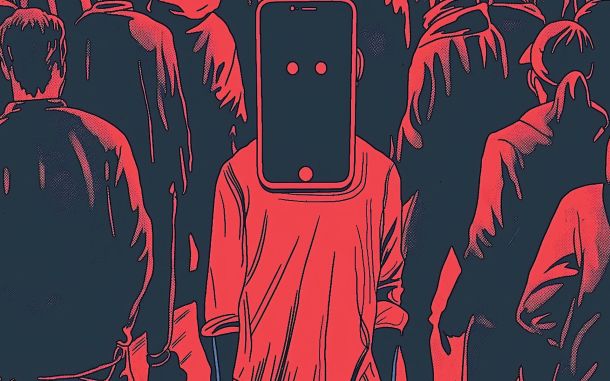Acknowledging Idling

In This Article
-
The reactivation of neural patterns while idling has been shown to be crucial to learning.
-
Idling affects both the physical responses of our brain, and our subjective mental experiences of stimuli.
-
“I try to remember that there is life outside of the ‘digital panopticon,’ where I am not sure if I’m being observed, but certainly observing myself.”
Attention is a very widely used, yet contested term in neuroscience [1], and therefore, easiest to define by its absence. The things we don’t actively do, studied via “resting-state” neural activity, also shape our behavior [2]. There is strong evidence for this: the reactivation of neural patterns while idling has been shown to be crucial to learning [3]. Cues we pick up during development, or experiences reinforced when we are “replaying,” “resting” or sleeping, form the framework against which we compare the stimuli when we are “doing” something. A more philosophical interpretation of this research is that idling affects both the physical responses of our brain, and our subjective mental experiences of stimuli. It follows, then, that the way humans spend our dwindling down time affects our mental frameworks, not only in childhood, but throughout our lifetime.
Periods of doing nothing were very common for our ancestors, and “mind-wandering” is a crucial human behavior. Needless to say, how our minds wander has changed drastically over the last twenty years, paralleling the technologies we spend our time with. Jelle Bruineberg, a cognitive scientist, describes the effects of undirected smartphone, tablet or computer use as “extended mind-wandering,” where the very human behavior of mind-wandering is performed through a device [4]. Bruinberg posits that extended mind wandering is changing our mental framework. He refers to “attention economy” as one of the primary factors affecting our mental spaces, defined by James Williams, a philosopher and ex-Google employee. We are passively bombarded with stimuli designed to keep us hooked, offering our attention in the digital marketplace in return for services. However, the goals of the platforms which run our lives are completely different from the goals of their users: to keep us sitting on our phones [5].
This has far-reaching repercussions: we are constantly exposed to increasingly sophisticated advertisements, creating a desire to perform or measure up. Even when I’m not online, I feel a bundle of nervous energy. What am I doing with my youth, my time, my ability to make money? This may seem like conflating the issues of feeling inadequate in comparison to others and feeling overwhelmed by piling up work. But the common thread between the general malaise of distraction and the desire for productivity might be a capitalist gaze [6], wherein we are constantly viewing ourselves through the eyes of a boss, consumer or appraiser. This doesn’t just affect our tasks, but by infiltrating even our idle moments, it reshapes the way we think and rest [7].
The combination of mind-wandering being such an important human function and the addictive stimuli that are easily accessible to wander through makes it difficult to "just disconnect." Access to our devices is inextricably linked to our closeness to social groups. The problem is that this access is perceptually presented alongside, and as equal to, a flood of stimuli from people who are much less important, creating warped cues for our minds. I’ve felt like I’m in a constant state of dissonance between people’s actual importance in my life and their salience. The overrepresentation of unimportant people warps my perception, making those most important to me seem less significant by comparison. This has worsened since I moved away from home. I mentally exaggerate the importance of interactions with colleagues and the judgmental, imagined audience of my life, rather than focusing on my actual family and friends. I’ve noticed a constant inward gaze, assessing my life, work, and leisure, and inevitably never feeling enough.
While this problem is much bigger than my own, many solutions I’ve found for this monopoly on our free time seem, paradoxically, to destroy it. The advice usually boils down to: “Do something else.” Much like other individual solutions to systemic problems, it seems to miss the point. It isn’t our activities that are being taken away from us, it is, as phrased by artist and writer Jenny Odell [8], our freedom to do nothing. Framing the problem differently: attention cannot be the solution to its absence. Crucially different from a life-hacky “rest in order to be more productive” perspective, Odell suggests that we imbue our idling with meaning, rather than treat it like a problem to fix.
Acknowledging idling lets me slip out of it and into attention. Recently, my method of idling is staring into space. I stare out of the bus window and watch my thoughts go by. I allot time to listen to music on my simple neighborhood walks, where I take a coffee for no reason, and go nowhere in particular. I still frequently wake up on Sunday mornings and feel a sense of panic about all that I could and should be doing. I find myself manically replying to texts and running analyses, attending to all the lives I should be living. Divesting from a capitalist gaze, where I’m reporting to myself, has been hard. I try to remember that there is life outside of the “digital panopticon,”* where I am not sure if I’m being observed, but certainly observing myself. After all, if billion-dollar companies have decided it is precious to have my mind wander into their fields, maybe I should believe them. I try to notice my mind wandering and choose the field in which I wander. If my mind takes me to homesickness, to despair, to chores – I try to, in the words of Rainer Maria Rilke, live with the questions.
On one of my simple little walks, I discovered I lived close to one of the oldest Jewish cemeteries in Europe, built in 1611. It was easy to find meaning in stumbling across it. Later, I called my father, and listened to him as the world returned to its undistorted form. I found myself on the first day of the summer, well-fed and watching the leaves sift sunlight. It felt like enough.
* “Digital panopticon” is a metaphor for Jeremy Bentham’s 18th century circular prison, in which inmates are under constant surveillance.
References
- Hommel et al., “No One Knows What Attention Is.”
- Pezzulo, Zorzi, and Corbetta, “The Secret Life of Predictive Brains: What’s Spontaneous Activity For?”
- Aly et al., “Selective Engram Coreactivation in Idling Brain Inspires Implicit Learning.”
- Bruineberg and Fabry, “Extended Mind-Wandering.”
- Williams, “Stand out of Our Light: Freedom and Resistance in the Attention Economy.”
- “The Capitalist Gaze (Todd McGowan) | PDF.”
- Bruineberg and Fabry, “Extended Mind-Wandering”; Williams, “Stand out of Our Light: Freedom and Resistance in the Attention Economy.”
- Odell, “How to Do Nothing: Resisting the Attention Economy.”









